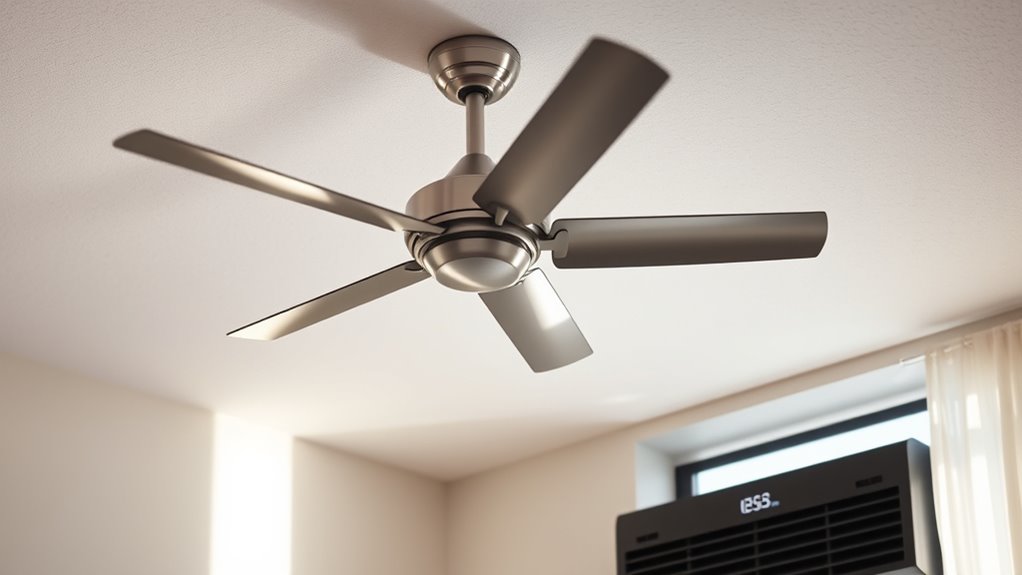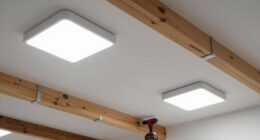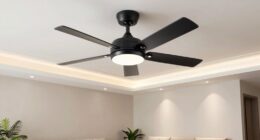Ceiling fans improve air circulation and promote evaporation, helping you feel more comfortable in humid environments, but they don’t actively reduce moisture levels. Window air conditioners, on the other hand, remove excess humidity while cooling the air, making them more effective for humidity control. If you want to manage humidity better, combining these with other solutions can be ideal. To find out which option suits your space best, explore further.
Key Takeaways
- Ceiling fans improve air circulation and promote evaporation but do not actively remove moisture from the air.
- Window AC units effectively dehumidify by removing moisture during cooling, lowering indoor humidity levels.
- Window ACs are more efficient at reducing humidity compared to ceiling fans, which mainly redistribute moisture.
- Ceiling fans help in humid environments but often need additional dehumidifiers for significant moisture reduction.
- For precise humidity control, combining window ACs or dehumidifiers with ceiling fans provides optimal indoor comfort.
How Ceiling Fans Impact Indoor Air Circulation
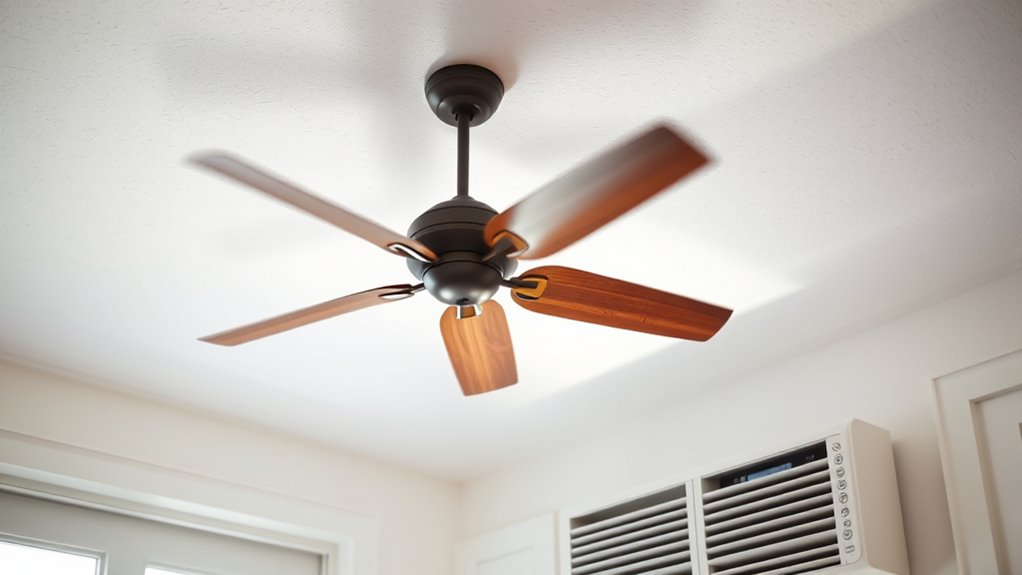
Have you ever wondered how ceiling fans influence the air you breathe indoors? They play a significant role in improving air circulation, which can affect overall air quality. By circulating air efficiently, ceiling fans help prevent stagnant spots, reducing the buildup of indoor pollutants and odors. This continuous movement disrupts the layering of stale air, promoting a fresher environment. Additionally, proper tuning of airflow can optimize the fan’s effectiveness in maintaining indoor air quality. Properly maintained fans ensure smooth operation, maintaining good air circulation without excessive noise. It’s also important to consider humidity control, as ceiling fans can help manage moisture levels, preventing mold growth and maintaining comfort. Furthermore, integrating vertical storage solutions and other organization techniques can help keep your space clutter-free, supporting healthier indoor environments. Overall, ceiling fans enhance indoor air quality through better airflow, but choosing quieter models can improve your experience, especially in bedrooms or quiet spaces.
The Humidity-Reducing Power of Window Air Conditioners
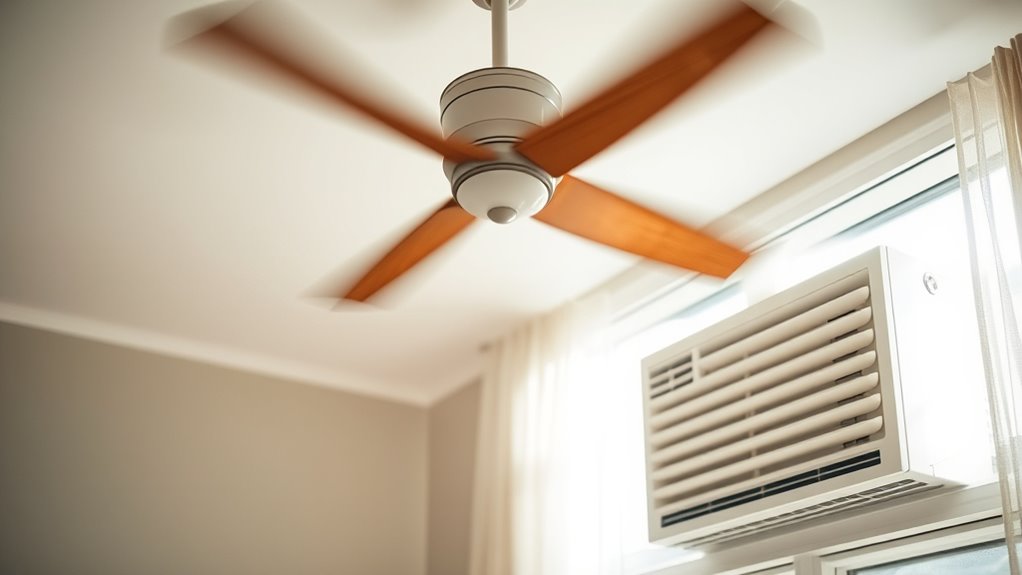
Window air conditioners are highly effective at reducing indoor humidity levels, especially during hot, humid days. They work by removing moisture from the air as part of their cooling process, helping you feel more comfortable. As they operate, they also improve air filtration, trapping dust and allergens, which enhances your indoor air quality. However, noise levels can vary; some units produce noticeable sounds that might be disruptive, especially at night. To envision this, consider:
Window ACs effectively reduce humidity and improve air quality, but noise levels may vary.
- The steady hum of the compressor as it cools and dehumidifies
- The airflow moving through the vents, aiding air circulation
- The filtration system quietly capturing airborne particles
These features make window ACs a practical choice for humidity control, but keep in mind the noise levels and air filtration capabilities when choosing your unit.
Comparing Cooling Efficiency for Humidity Control

When it comes to humidity control, you’ll notice that window AC units excel at removing moisture more effectively than ceiling fans. Ceiling fans mainly improve air circulation but don’t actively reduce humidity levels. To truly compare their cooling efficiency for humidity, consider both moisture removal and how well they circulate air in your space. Additionally, understanding the role of gorse plants in supporting bee health highlights the importance of natural environmental factors in maintaining ecological balance. For optimal humidity management, the humidity removal capacity of a device is a critical factor to evaluate alongside air circulation. Evaluating the energy efficiency of cooling options can also influence overall humidity control performance and operational cost.
Moisture Removal Effectiveness
Ever wondered which cooling option handles humidity better? When it comes to moisture removal, a window AC outperforms a ceiling fan due to its ability to actively reduce humidity levels through humidity absorption and moisture evaporation. Unlike a ceiling fan, which mainly circulates air without removing moisture, a window AC cools and dehumidifies simultaneously.
A window AC’s dehumidification process helps maintain optimal indoor humidity levels, making it especially beneficial in humid climates.
Picture this:
- The window AC pulls in warm, humid air, absorbing moisture from it.
- It cools the air, causing moisture to evaporate from surfaces and be drained away.
- The result is noticeably drier, more comfortable air in your space.
This process makes a window AC a more effective choice for controlling humidity levels, especially in damp environments. It’s designed to handle moisture with precision, unlike a ceiling fan that only provides air movement.
Air Circulation Impact
Because air circulation plays a crucial role in cooling efficiency and humidity control, a ceiling fan and a window AC impact moisture levels differently. A ceiling fan uses airflow patterns to circulate air within a room, creating a breeze that enhances evaporation and makes you feel cooler without changing moisture levels considerably. It doesn’t have dehumidification technology, so it doesn’t actively remove moisture from the air. In contrast, a window AC actively dehumidifies the environment by pulling moisture out as part of its cooling cycle, improving humidity levels. Its airflow patterns direct air over cooling coils, which condense moisture. This difference in air circulation impacts how effectively each device manages humidity, with the AC providing more precise humidity control, while the ceiling fan relies on natural airflow to influence comfort. Additionally, airflow patterns techniques can be used to optimize airflow patterns and enhance overall room comfort, especially in rustic farmhouse bedrooms where maintaining proper humidity is essential for preserving decor and furniture.
Benefits and Limitations of Ceiling Fans in Humid Environments

Ceiling fans improve air circulation, making you feel cooler even if they don’t lower humidity directly. However, in humid environments, their ability to reduce moisture is limited. Understanding these benefits and limitations helps you decide if they’re enough or if other options are needed. Additionally, selecting a preppy dog name can reflect a sophisticated aesthetic that complements your stylish space. Humidity management strategies like dehumidifiers can further enhance comfort when humidity levels are high, especially since portable camping toilets are not effective for moisture control indoors.
Air Circulation Efficiency
In humid environments, ceiling fans can substantially improve air circulation, helping to create a more comfortable indoor space. They promote consistent airflow, preventing stagnant air that can harm indoor plant health and worsen allergen and dust buildup. Enhanced circulation can make you feel cooler without removing moisture from the air, which is beneficial in humid conditions. Proper placement and maintenance are key to maximizing their benefits. Additionally, selecting the appropriate air circulation methods can enhance overall comfort and energy efficiency. Moreover, understanding the role of attention in creative practice can help optimize how you operate and enjoy your ceiling fan, ensuring it effectively contributes to your comfort.
Humidity Reduction Limits
While ceiling fans excel at enhancing air circulation, they don’t directly lower humidity levels in humid environments. Unlike dehumidifiers, which actively remove moisture from the air, ceiling fans primarily promote evaporation by increasing airflow. A new sentence with performance upgrades and the rest of the sentence. However, this moisture absorption is limited; fans can’t considerably reduce high humidity on their own. In very humid conditions, relying solely on ceiling fans may lead to a false sense of comfort without actually decreasing moisture content. Their effectiveness plateaus because they don’t extract water vapor, meaning you’ll need a dehumidifier for more substantial humidity reduction. Without this additional equipment, ceiling fans reach their moisture absorption limits, making them less suitable for controlling humidity in excessively damp spaces. Additionally, air circulation can sometimes redistribute humidity rather than eliminate it, which may not improve comfort in highly humid environments. Understanding the limitations of ceiling fans can help you make better decisions for humidity control.
How Window AC Units Help Maintain a Comfortable Humidity Level

Window AC units play a crucial role in controlling humidity levels, helping you stay comfortable indoors. They remove excess moisture from the air, maintaining a balanced environment. Their dehumidifier effectiveness means they can quickly reduce humidity, preventing that sticky feeling and discomfort. By lowering moisture levels, they also help prevent mold growth, which thrives in damp conditions. Additionally, modern units often include humidity control features, enhancing their ability to maintain optimal indoor moisture levels. Imagine walking into a cool room where the air feels fresh and dry: – You notice the air is crisp, not muggy or damp – No musty smell or signs of mold around – Your skin feels less sticky, and breathing is easier. Many models are praised for their performance and durability, making them a reliable choice for humidity management. These features make window AC units a practical choice for humidity control, especially in humid climates. They keep your space comfortable while reducing mold risk effectively.
Cost and Energy Considerations for Humidity Management

Managing humidity with window AC units can be cost-effective upfront, but it’s important to contemplate ongoing energy expenses. Your cost analysis should weigh the initial purchase against long-term energy efficiency. Window ACs typically consume more power, leading to higher bills over time. To help you compare, here’s a quick look:
| Feature | Ceiling Fan | Window AC |
|---|---|---|
| Operating Costs | Low | Moderate to High |
| Energy Efficiency | Very efficient | Less efficient |
| Humidity Control | Less effective | Better, but costs more |
While window ACs can better manage humidity, they often cost more to run. Ceiling fans are cheaper but may require supplemental dehumidification.
Making the Right Choice for Your Home’s Humidity Needs
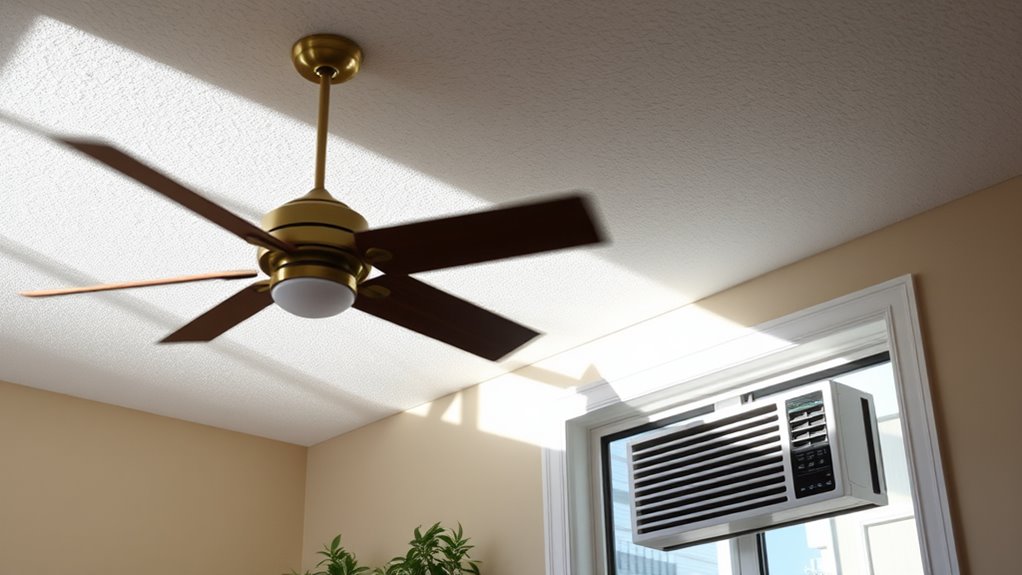
Choosing the right method to control humidity depends on your home’s specific needs and priorities. If you want precise control, consider installing humidity sensors to monitor moisture levels accurately. For consistently damp spaces, a dehumidifier installation can be highly effective, removing excess moisture efficiently. Think about your living environment:
- A basement with persistent dampness may benefit most from a dehumidifier.
- A living room where humidity fluctuates can be managed with humidity sensors to adjust ventilation or cooling.
- Small bedrooms might only require ceiling fans for gentle air circulation, avoiding over-drying the air.
Assess your space and moisture concerns carefully. Combining humidity sensors with targeted dehumidifier installation ensures ideal comfort and prevents mold or mildew growth while maintaining ideal humidity levels.
Frequently Asked Questions
Can Ceiling Fans Reduce Humidity Levels Effectively?
Ceiling fans don’t directly reduce humidity, but they improve air circulation, helping to make the air feel cooler and more comfortable. By moving air around, they can assist in moisture reduction slightly, especially when combined with dehumidifiers or ventilation. While they won’t eliminate excess humidity on their own, ceiling fans are effective in enhancing overall air quality and comfort in humid environments by promoting better air movement.
How Do Window AC Units Compare in Humidity Control for Large Spaces?
Like a lighthouse guiding ships through fog, a window AC unit navigates humidity in large spaces. It actively dehumidifies by removing moisture from the air, making it more comfortable. Compared to ceiling fans, window units often offer better humidity control, especially in bigger rooms. While they may use more energy and produce higher noise levels, they excel at maintaining consistent humidity levels, making your space more livable and less stuffy.
Are There Hybrid Systems That Combine Ceiling Fans and AC for Better Humidity Management?
You’ll find that hybrid systems, combining ceiling fans and air conditioning, can improve humidity management effectively. These setups allow you to circulate air efficiently while cooling, helping to balance moisture levels in your space. By using both, you can maintain a comfortable environment without over-relying on AC, which often reduces humidity too much. This combination offers better overall control, ensuring your space stays comfortable and properly ventilated.
What Maintenance Is Required for Optimal Humidity Control Using These Devices?
To maintain ideal humidity control, you should regularly clean and replace filters in your devices to guarantee efficiency. Check electrical safety by inspecting cords and connections for wear or damage, preventing hazards. Keep ceiling fans clean and ensure blades spin freely, while window AC units need annual professional servicing. Proper maintenance helps your devices run smoothly, effectively managing humidity and keeping your indoor environment comfortable and safe.
Do Ceiling Fans or Window ACS Impact Indoor Air Quality Besides Humidity?
Did you know indoor air can contain pollutants 2-5 times higher than outside? Ceiling fans and window ACs both impact air quality through air filtration and circulation. Ceiling fans improve air circulation, helping disperse indoor pollutants, but they don’t remove particles. Window ACs often have filters that trap dust and allergens, enhancing air quality. So, both contribute to cleaner indoor air, but ACs generally offer better filtration.
Conclusion
Ultimately, choosing between ceiling fans and window ACs depends on your humidity hunches. If you want to whiz through warmth and wick away moisture, a window AC’s awesome air-conditioning ability might be your answer. But if you prefer a fan’s fresh flow and cost-conscious comfort, ceiling fans could be your best bet. Weigh your needs wisely, and you’ll whip humidity into shape without wavering. Your perfect climate control is just a decision away!
